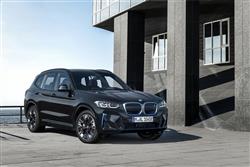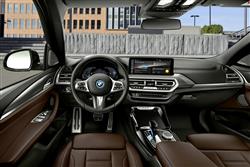BMW iX3 - ABC Leasing
How will you view?
This is a sample, showing 30 seconds of each section.
GREATER THREE MARKET ECONOMY(some text hidden)
By Jonathan Crouch
Ten Second Review word count: 73
The BMW iX3 marks a new phase of electric vehicle development from the Munich maker. The brand's '5th generation' electrified tech delivers a very competitive 285 mile range and it's all been built into the X3 floorplan in such a way as to minimise the usual EV handling downsides of extra bulk and weight. Here's an electric car that someone used to a combustion model might be able to adapt to remarkably easily.
Background word count: 135
The iX3 is only BMW's second ever full-electric model, but it claims to move the EV genre on in various important ways. Its importance for the Munich maker lies in the fact that this is the first car from the brand to be produced in China for export to world markets. Production takes place at the joint venture factory in Shenyang, Liaoning operated jointly by BMW and Chinese manufacturer Brilliance. Much is shared here with the new '5th generation' EV technology that BMW has developed for its new i4 saloon and iNEXT SUV models, said to use battery charge more efficiently. And the iX3's arrival means that the brand's familiar X3 mid-sized SUV becomes the first of the Munich maker's models to be offered with a choice of combustion, plug-in or full EV power options.
Driving Experience word count: 219
You tend to have higher expectations of the handling of any BMW, even a fully electric one, and the Munich maker didn't want this iX3 to disappoint. Hence the clever way that the battery here has been integrated within the floorplan, lowering the centre of gravity by up to 75mm over the standard X3 for what BMW describes as 'noticeably enhanced lateral dynamics'. Which is just as well because like other EVs, this one has a bit of a weight problem, tipping the scales at nearly 2.2 tonnes. That's despite the fact that it has a slightly smaller battery than some rivals - it's 80kWh in size, though only 74kWh of that is usable. The quoted WLTP driving range figure of up to 285 miles is class-competitive though. The iX3 is exclusively rear-driven, power coming from a rear-mounted electric motor producing 286hp which revs far higher than any of BMW's earlier motors - up to 17,000rpm, compared to the 14,000rpm of the brand's existing i3 EV hatch. As you'd expect, it's mated to a single-speed auto gearbox. 62mph from rest occupies 6.8 seconds, which is just 0 4s slower than the conventional X3 sDrive30i 2.0-litre petrol turbo model. But top speed is limited to 112mph in order to protect the range. Adaptive suspension with electronically controlled dampers is standard.
Pictures (High res disabled)

.jpg)
.jpg)
.jpg)
.jpg)
.jpg)
.jpg)
.jpg)
.jpg)
.jpg)
.jpg)
.jpg)
.jpg)

Scoring
Category: Compact Car
| Performance | |
| Handling | |
| Comfort | |
| Space | |
| Styling | |
| Build | |
| Value | |
| Equipment | |
| Economy | 80% |
| Depreciation | 70% |
| Insurance | 70% |
| Total | 70% |